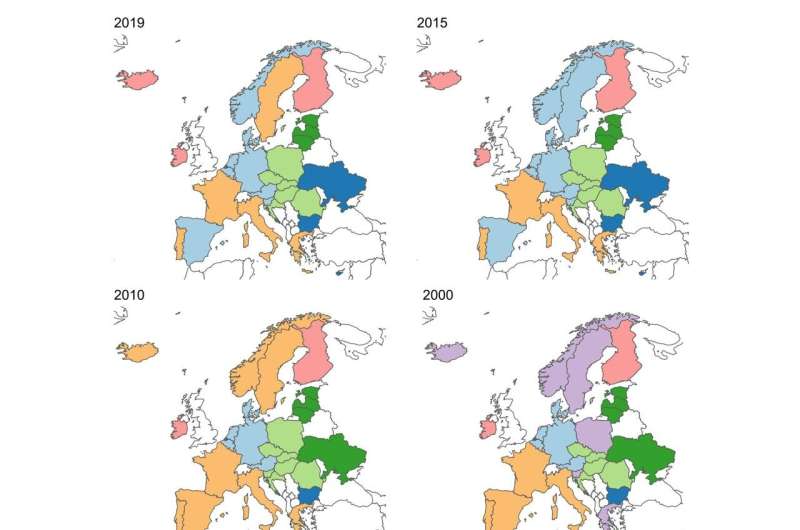This article has been reviewed according to Science X's editorial process and policies. Editors have highlighted the following attributes while ensuring the content's credibility:
fact-checked
peer-reviewed publication
proofread
European countries differ in their drinking styles, study finds

A new study of drinking patterns across Europe from 2000 to 2019 shows that drinking occurs in stable, beverage-specific clusters that seem to be partly determined by geography. The study was published today by the scientific journal Addiction.
The study identified six drinking patterns in Europe in 2019:
- Wine-drinking countries: France, Greece, Italy, Portugal, and Sweden. Characterized by the highest consumption of wine, lowest consumption of beer and spirits, and lowest overall alcohol consumption.
- High beer/low spirit drinking countries: Austria, Belgium, Denmark, Germany, Netherlands, Norway, Slovenia, and Spain. Characterized by high consumption of beer, relatively low consumption of spirits, and the highest consumption abroad.
- High beer/binge drinking countries: Croatia, Czech Republic, Hungary, Poland, Romania, and Slovakia. Characterized by high overall alcohol consumption, with the highest consumption of beer and high prevalence of heavy episodic drinking.
- High spirit drinking countries: Estonia, Latvia, and Lithuania. Characterized by the highest consumption of spirits but also high beer consumption, resulting in the highest overall alcohol consumption, but lowest wine consumption and low binge drinking—instead of regular high consumption.
- High spirit drinking/high lifetime abstinence countries: Ukraine, Bulgaria, and Cyprus. Characterized by the lowest prevalence of drinkers (and highest prevalence of lifetime abstainers), but high and regular consumption of spirits.
- Countries with high prevalence of current and binge drinking: Finland, Iceland, Ireland, Luxembourg, and Malta. Characterized by the highest prevalence of drinkers and binge drinking.
Looking back almost 20 years, the same overall clusters were in place from 2000 to 2019, with two-thirds of the countries staying in the same cluster for all measurements.
The study found significant associations between drinking patterns and alcohol-attributable deaths and health harm (measured in terms of 'disability-adjusted life years': the number of years lost due to ill-health, disability, or early death). Countries with high consumption of spirits and/or high prevalence of binge drinking—Estonia, Latvia, Lithuania, Ukraine, Bulgaria, and Cyprus—had the highest average alcohol-attributable deaths and health harm.
Co-author Dr. Jürgen Rehm comments, "Europe's distinct drinking patterns seem to be deeply rooted in culture and are therefore difficult to change. Since drinking patterns are strongly associated with burden of disease and mortality, we must find ways to change the patterns which characterize the clusters with the highest alcohol-attributable burden. Alcohol policies for this change are available and should be considered by all European countries, as the overall level of drinking is still high in this region."
More information: Classifying national drinking patterns in Europe between 2000 and 2019: A clustering approach using comparable exposure data, Addiction (2024). DOI: 10.1111/add.16567



















